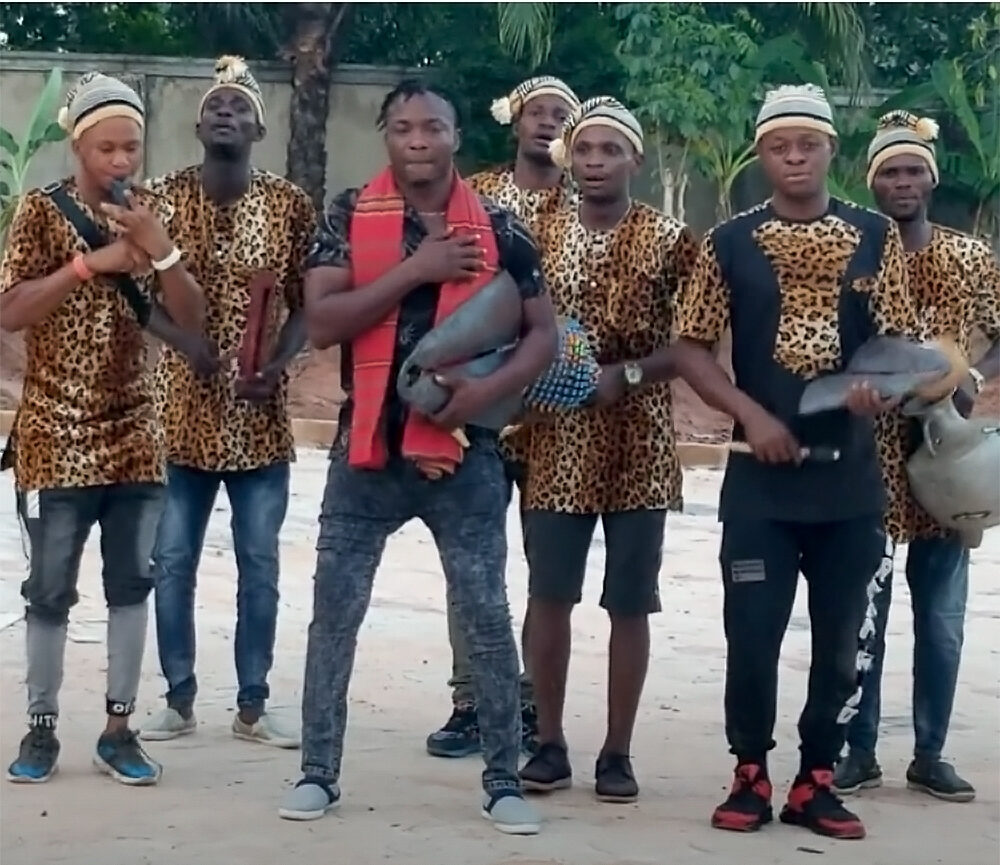ENTERTAINMENT
Ogene: A Symbol Of Cultural Heritage, Social Unity In Igbo Society

By Tony Onyima PhD*
Ejyk Nwamba, a Nkanu-born Enugu State musician, is quickly becoming a cultural icon. With his youthful exuberance and dexterity on the Ogene instrument, he has continued to create rhythmic tunes that have become a social media sensation.
His ability to combine popular gospel lyrics with traditional Ogene instrumentation demonstrates that innovation is not only incremental, but essential to growth.
The Ogene, a traditional metallic musical instrument, is central to the Igbo people’s social and cultural lives.
It is more than just a form of entertainment; it is also a means of communication, celebration, and artistic expression. In the Igbo context, the Ogene is important in the creation of Egwu Ogene, a music genre that represents the Igbo people’s vibrancy, storytelling, and traditions.
This essay examines the Ogene’s significance, role in Igbo society, the areas of Igbo land where it can be found, and its connections to individuals such as Chyke Nwamba and scholarly authorities who have helped to preserve and evolve this beloved instrument.
The Ogene is made of metal, typically iron, and is designed to produce a sharp, resonant sound. Its design entails shaping the metal into a circular or semi-circular shape, with a handle that allows the player to strike it rhythmically.
Because the instrument’s distinctive ringing tone can travel long distances, it has traditionally been used for public announcements, as a signal during celebrations, and even to summon the community for meetings.
The Ogene is widely regarded as the Igbo equivalent of the “bell” in other cultures, representing authority, unity, and the community’s voice.
Pre-colonial Igbo society used the Ogene in a variety of social contexts, including traditional dance forms, community festivals, and rites of passage such as marriages and burials.
Its sound was thought to carry ancestral messages, bridging the spiritual and physical worlds.
One of the most important musical traditions associated with the Ogene is Egwu Ogene.
This musical genre, known as “Ogene music,” combines rhythm and lyrical storytelling to reflect the Igbo people’s daily lives, struggles, celebrations, and philosophical musings. Egwu Ogene is distinguished by its lively, upbeat tempo, making it an essential component of Igbo social events such as the Atilogwu dance and other celebrations.
Song lyrics frequently address social issues, historical events, and family experiences, serving as a vehicle for cultural transmission and public discourse. The Ogene’s powerful and melodic sound complements the dynamic rhythms of the dance and music, creating a contagious energy that brings everyone together.
Chyke Nwamba, a well-respected figure in Igbo music, is one of the leading artists known for popularising Egwu Ogene in contemporary settings. Nwamba’s artistic journey showcases how the Ogene can be adapted to modern tastes while preserving its traditional essence.
He skillfully combines the traditional sounds of the Ogene with modern instrumentation and techniques, bringing the music of the Igbo people into the contemporary world. His work helps ensure that the cultural and historical significance of the Ogene is not lost on younger generations who may not be as connected to their ancestral roots.
Scholars like Uche Nwankwo, who has written extensively on Igbo music, have pointed out that the Ogene is more than just a musical instrument; it is a powerful storytelling and cultural preservation tool. In his analysis, Nwankwo highlights how the Ogene, through its rhythmic resonance, conveys Igbo society’s emotions, wisdom, and values.
He argues that the Ogene and Egwu Ogene serve as oral history, offering insights into the Igbo people’s communal life, social structure, and spiritual beliefs. By performing and promoting these forms of music, artists like Nwamba and scholars play a pivotal role in keeping the Igbo cultural identity alive in a globalised world.
Furthermore, cultural scholars such as Chinua Achebe and Ngugi wa Thiong’o have emphasised the role of traditional musical instruments like the Ogene in maintaining the richness of African cultural heritage. In his literary works, Achebe often reflects on the importance of music, language, and tradition in the Igbo worldview.
The Ogene, a musical instrument and a symbol of unity, becomes a crucial representation of this heritage.
The Ogene is prevalent in several parts of Igbo land, with its influence and prominence especially notable in Anambra, Enugu, Ebonyi, Imo and Abia States.
In a rapidly changing world, the Ogene stands as a symbol of cultural continuity and resilience. It plays an integral role in traditional celebrations and serves as a bridge between the past and the present, linking contemporary Igbo identity with its historical roots.
The work of artists like Chyke Nwamba ensures that the instrument remains relevant, blending the old with the new and appealing to traditionalists and modern listeners alike.
In conclusion, the Ogene is more than just a musical instrument; it is a cultural icon that connects generations of Igbo people, communicates their stories, and preserves their traditions. Its importance in creating Egwu Ogene demonstrates the instrument’s deep roots in Igbo social life.
-
CRIME3 years ago
PSC Dismisses DCP Abba Kyari, To Be Prosecuted Over Alleged $1.1m Fraud
-
FEATURED4 years ago
2022 Will Brighten Possibility Of Osinbajo Presidency, Says TPP
-
FEATURED2 years ago
Buhari’s Ministers, CEOs Should Be Held Accountable Along With Emefiele, Says Timi Frank
-
BUSINESS & ECONOMY2 years ago
Oyedemi Reigns As 2023’s Real Estate Humanitarian Of The Year
-
SPORTS2 years ago
BREAKING: Jürgen Klopp Quits Liverpool As Manager At End Of Season
-
SPORTS2 years ago
Could Liverpool Afford Kylian Mbappe For €200 million? Wages, Transfer Fee
-
ENTERTAINMENT2 years ago
Veteran Nigerian Musician, Basil Akalonu Dies At 72
-
FEATURED2 years ago
Tribunal Judgement: Peter Obi Warns Of Vanishing Electoral Jurisprudence, Heads To Supreme Court
-
BUSINESS & ECONOMY2 years ago
Oyedemi Bags ‘Next Bulls Award’ As BusinessDay Celebrates Top 25 CEOs/ Business Leaders
-
FEATURED3 years ago
2023 Presidency: South East PDP Aspirants Unite, Demand Party Ticket For Zone



































